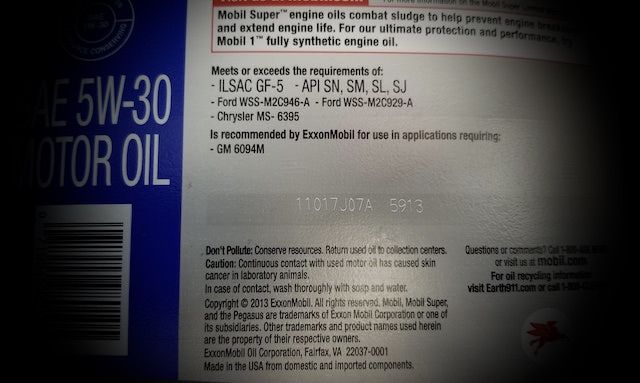Have you ever wondered why motor oil, a product that seems so durable, comes with an expiration date? It might seem puzzling, considering oil’s primary role is to lubricate and protect your vehicle’s engine.
Yet, understanding the reasons behind this expiration can be crucial for your car’s health and performance. Ignoring these dates could lead to unexpected breakdowns or costly repairs, impacting your day-to-day life and financial peace of mind. By the end of this article, you’ll discover the hidden truths about motor oil’s lifespan and how this knowledge can empower you to make smarter choices for your vehicle.
Dive in, and ensure your car runs smoothly and efficiently for years to come.
Chemical Composition
Motor oil is more than just a lubricant for your engine. It comprises a complex mix of base oils and additives. This combination ensures your engine runs smoothly and efficiently. But even this well-crafted formula isn’t immune to time.
Understanding Base Oils
Base oils form the foundation of motor oil. They determine its viscosity and lubrication properties. Over time, exposure to air and heat can alter these oils. This leads to reduced effectiveness in protecting engine parts.
Role Of Additives
Additives enhance the performance of motor oil. They prevent rust, reduce wear, and clean the engine. But they degrade with time. Once they break down, the oil loses its protective qualities.
Oxidation Process
Oxidation is a chemical reaction with oxygen. It affects motor oil over time, changing its composition. This process thickens the oil, reducing its ability to lubricate.
Impact Of Contaminants
Dirt, dust, and engine debris can mix with motor oil. These contaminants alter the oil’s chemical makeup. As contamination builds, the oil’s efficiency drops.
Storage Conditions
Where and how oil is stored affects its longevity. Heat and moisture can accelerate chemical changes. Proper storage helps maintain oil quality longer.

Credit: www.reddit.com
Factors Influencing Shelf Life
Motor oil has an expiration date due to chemical degradation over time. Heat, moisture, and contaminants can reduce its effectiveness. Proper storage can extend its lifespan, but eventually, it loses its protective qualities.
Motor oil, like any other product, has a shelf life that can be influenced by various factors. Understanding these factors is crucial for ensuring the oil remains effective when you need it most. Whether you’re storing oil in your garage or considering the packaging it comes in, the key is to maintain its integrity until it’s used. Let’s dive into what affects the shelf life of motor oil and why it’s important for your vehicle’s health.Storage Conditions
Where you store your motor oil can significantly impact its shelf life. Imagine leaving a bottle in a damp, fluctuating temperature garage versus a cool, dry basement. Moisture and extreme temperatures can cause the oil to degrade faster, potentially affecting its performance when used. Keeping your motor oil in a stable environment helps maintain its quality. A dry, cool area away from direct sunlight is ideal. This way, you can avoid the unwanted breakdown of its essential properties, ensuring it’s ready to protect your engine when you need it.Packaging Integrity
The integrity of the packaging plays a crucial role in preserving the oil. Think about a bottle with a loose cap or one that has been punctured. These scenarios can lead to contamination, compromising the oil’s effectiveness. Always check that the packaging is intact and sealed properly. A strong seal prevents air and moisture from entering, which can cause oxidation and contamination. If you notice any damage to the packaging, it’s wise to reconsider using that oil for your vehicle. Have you ever wondered why manufacturers emphasize the importance of packaging? It’s because a compromised container can lead to a compromised product. Being diligent about packaging quality can save you from potential engine troubles down the road. By paying attention to storage and packaging, you not only extend the shelf life of motor oil but also ensure your vehicle runs smoothly. How often do you check the conditions where your motor oil is stored? Remember, these small actions can have a big impact on your vehicle’s performance.Impact Of Expired Oil
Motor oil plays a crucial role in keeping engines running smoothly. But, like many products, it has an expiration date. Using expired oil can lead to various problems. It’s essential to understand these issues to maintain engine health. Let’s explore the impact of expired oil.
Engine Performance
Expired oil can significantly affect engine performance. Over time, oil loses its effectiveness. Its ability to clean and protect diminishes. This can lead to a sluggish engine response. The engine may not run as efficiently. You might notice increased fuel consumption. Ignoring these signs can lead to severe engine damage.
Lubrication Efficiency
Lubrication efficiency drops with expired oil. Oil is meant to reduce friction between engine parts. When oil ages, its properties change. It becomes thicker and less efficient. This increases wear on engine components. More friction means more heat. Excessive heat can cause engine parts to warp. Ultimately, this shortens the engine’s lifespan. Regular oil changes are vital to avoid these issues.

Credit: www.blauparts.com
Signs Of Degradation
Motor oil plays a crucial role in engine health. Over time, it can degrade, reducing its effectiveness. Recognizing signs of degradation can help maintain engine performance. Let’s explore the key indicators of motor oil deterioration.
Color And Consistency
Fresh motor oil has a light amber color. As it ages, the color darkens. Dark oil often indicates contamination or oxidation. Consistency changes too. New oil feels smooth between fingers. Degraded oil may feel thicker or gritty. These changes signal it’s time for a replacement.
Presence Of Contaminants
Contaminants can accumulate in motor oil over time. Dirt, metal particles, and sludge are common culprits. They reduce oil’s protective qualities. Check for visible particles in the oil. A clear indication of contamination. Contaminated oil can harm engine components, leading to costly repairs.
Best Practices For Storage
Proper storage of motor oil extends its shelf life. It ensures optimal performance. Avoiding exposure to harsh conditions is key. This helps preserve the oil’s integrity. Let’s explore some best practices for storing motor oil effectively.
Temperature Control
Store motor oil in a cool, dry place. Excessive heat degrades oil quality. Temperatures above 80°F can accelerate oil breakdown. Cold temperatures are also problematic. They cause oil thickening. Ideally, maintain a consistent room temperature. This helps preserve the oil’s properties.
Avoiding Moisture
Moisture is harmful to motor oil. It can lead to contamination. Always keep oil containers sealed tightly. This prevents moisture ingress. Store oil on shelves, away from floors. It reduces the risk of water exposure. Also, avoid areas prone to humidity. A dry environment ensures longer oil life.
Myths And Misconceptions
Motor oil expires because its additives break down over time. This affects its ability to protect the engine. Exposure to air and moisture also leads to degradation, reducing its effectiveness.
In the world of car maintenance, myths and misconceptions are as common as oil changes. You might have heard someone claim that motor oil never expires or that storing it in a cool, dark place can make it last forever. But have you ever stopped to question these beliefs? Understanding the truth behind motor oil’s expiration date can save you money and prevent engine damage.Myth 1: Motor Oil Lasts Indefinitely
Many people believe that motor oil doesn’t have an expiration date. They assume that since it’s a lubricant, it should work fine regardless of its age. However, like any chemical product, motor oil degrades over time. Additives break down and the oil loses its effectiveness, potentially leading to engine problems.Myth 2: The Shelf Life Is Just A Marketing Gimmick
Some think that the expiration date is a ploy to get you to buy more oil. But that’s far from the truth. Manufacturers set expiration dates based on the chemistry of oil and the breakdown of additives. It’s not about selling more; it’s about ensuring your engine runs smoothly.Misconception 1: All Oil Types Expire At The Same Rate
Contrary to popular belief, not all motor oils expire at the same rate. Synthetic oils usually have a longer shelf life compared to conventional oils. Knowing what type of oil you’re using can help you plan your purchases better.Misconception 2: Storage Conditions Don’t Matter
You might think storing oil in any condition is fine, but that’s a misconception. Temperature fluctuations and exposure to light can accelerate the degradation process. Keeping oil in a stable environment can extend its usable life.Thought-provoking Insight: Is It Worth The Risk?
Why risk using expired oil? The cost of replacing engine parts damaged by ineffective oil can be far more than the price of a new bottle. Is it worth jeopardizing your engine’s health over a few dollars?Conclusion: Knowledge Is Power
Understanding these myths and misconceptions empowers you to make smarter choices. Next time you’re about to buy motor oil, remember its expiration date is there for a reason. Your engine will thank you for it.Choosing The Right Motor Oil
Choosing the right motor oil is essential for ensuring your vehicle runs smoothly and efficiently. With various options on the market, selecting the best one can be overwhelming. Whether you’re a seasoned driver or a newbie, understanding labels and consulting manufacturer guidelines can simplify the process.
Understanding Labels
Motor oil labels can seem like a jumble of letters and numbers. But these labels are your best friend when choosing the right oil. They tell you about the oil’s viscosity, performance standards, and suitability for specific engines.
Think of viscosity as the thickness of the oil. It determines how well the oil flows in different temperatures. A low viscosity oil might be great for cold climates, while higher viscosity is better for warmer areas.
Performance standards, often marked by ratings like API (American Petroleum Institute), indicate how the oil will perform under various conditions. It’s important to match these standards to your vehicle’s needs. Have you ever experienced engine knocking or overheating? It might be because the oil doesn’t meet the necessary standards.
Consulting Manufacturer Guidelines
Before purchasing motor oil, check your vehicle’s manual. Manufacturers provide specific guidelines for the type of oil your engine needs. Ignoring these can lead to reduced performance or even damage.
Why guess when you have a clear roadmap? Manufacturer guidelines are designed to protect your vehicle and optimize its longevity. They take into account factors like engine design and regional climate conditions.
Have you ever noticed changes in your vehicle’s performance after switching oil brands? It’s likely because you didn’t follow the recommended guidelines. Sticking to them ensures your engine remains in top shape.
Choosing the right motor oil isn’t just about picking the brand with the flashy label. It’s about understanding what your vehicle truly needs. Take the time to analyze labels and consult your manufacturer’s guidelines. Your vehicle will thank you.

Credit: www.gopurepower.com
Conclusion
Motor oil does expire, impacting engine performance and longevity. Over time, oil loses its effectiveness. Additives break down, reducing protection. Contaminants accumulate, leading to sludge formation. This affects engine health and efficiency. Regularly check oil’s expiration date. Change it as needed for optimal performance.
Fresh oil ensures better lubrication and reduced wear. Protects your engine from damage. Using expired oil risks costly repairs. Simple maintenance saves money in the long run. Keep your vehicle running smoothly. Always prioritize quality and timely oil changes. Your engine will thank you with reliable performance.
